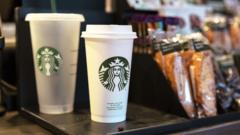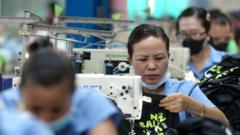Starbucks has revealed plans to eliminate 1,100 jobs and streamline its menu, reducing offerings by nearly a third. This strategic shift comes as the company faces declining sales and aims to enhance customer experience and operational efficiency.
Starbucks Restructures Staff and Menu in Response to Sales Decline

Starbucks Restructures Staff and Menu in Response to Sales Decline
The coffee giant announces significant job cuts and a drastic menu overhaul in an effort to revitalize its struggling US operations.
Starbucks is embarking on a major restructuring initiative, announcing the reduction of 1,100 jobs alongside a significant simplification of its menu in the US. This move is in direct response to a troubling decline in sales that has persisted since last year, particularly in its home market. The first phase of cuts includes the elimination of drinks such as the Royal English Breakfast Latte and White Hot Chocolate, as well as various frappuccinos. The company intends to remove less popular and more complex items, aiming to streamline its offerings by almost a third over the course of the next year.
According to CEO Brian Niccol, who previously led the successful Mexican restaurant chain Chipotle, the vision is to re-establish Starbucks as a genuine coffee house. Niccol’s plan is to simplify the beverage options to focus on more frequently purchased items, which should result in decreased wait times and enhanced product quality.
These layoffs will primarily affect corporate roles, specifically in support functions, and are not expected to impact store positions. Starbucks executed plans to notify affected employees by noon on Tuesday while also cutting several hundred unfilled positions. In a bid to boost efficiency and accountability, Niccol emphasized that these changes are essential for driving better integration across the business.
Despite boasting a workforce of over 360,000 and more than 40,000 stores around the globe, Starbucks has struggled with customer retention in the US, grappling with complaints over lengthy wait times, rising prices, and labor disputes concerning unionization efforts among baristas. The company has also faced criticism and boycott calls connected to its stance on the Israel-Gaza war, further complicating its brand perception.
The latest financial report revealed an 8% drop in transactions at US stores open for at least a year, compared to the same quarter last year. The new strategy, as expressed in the recent announcement, reflects a pivot away from previously personalized drink offerings.




















